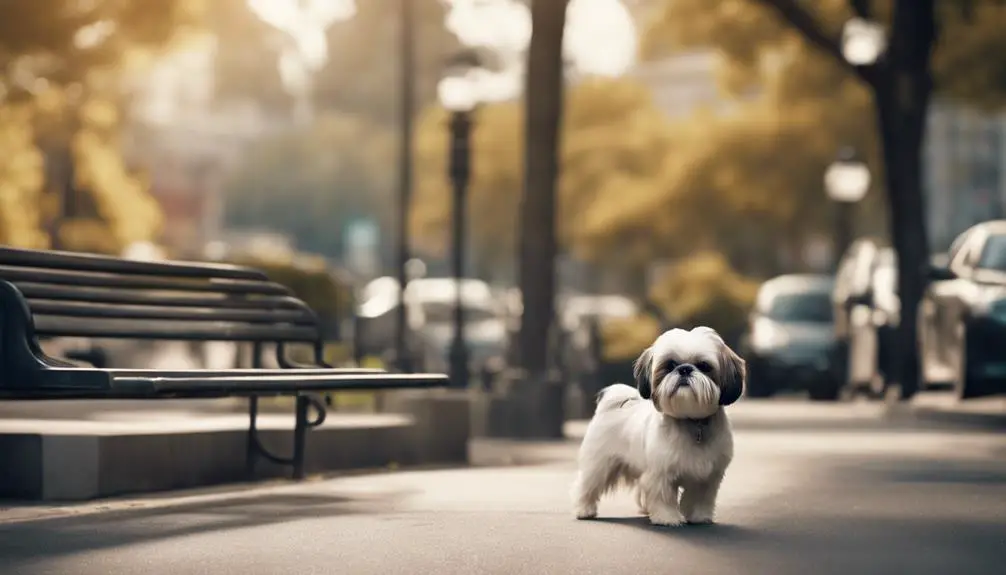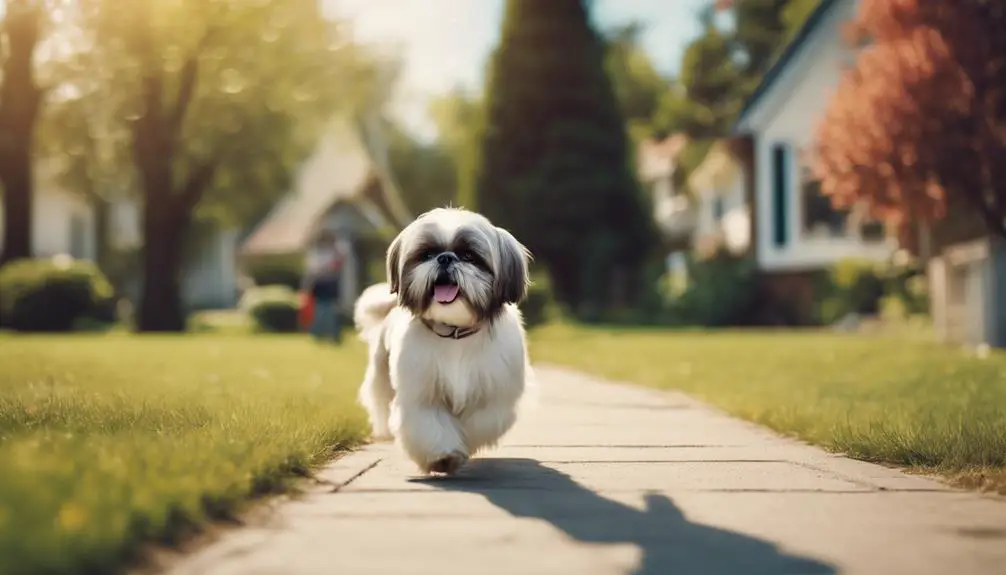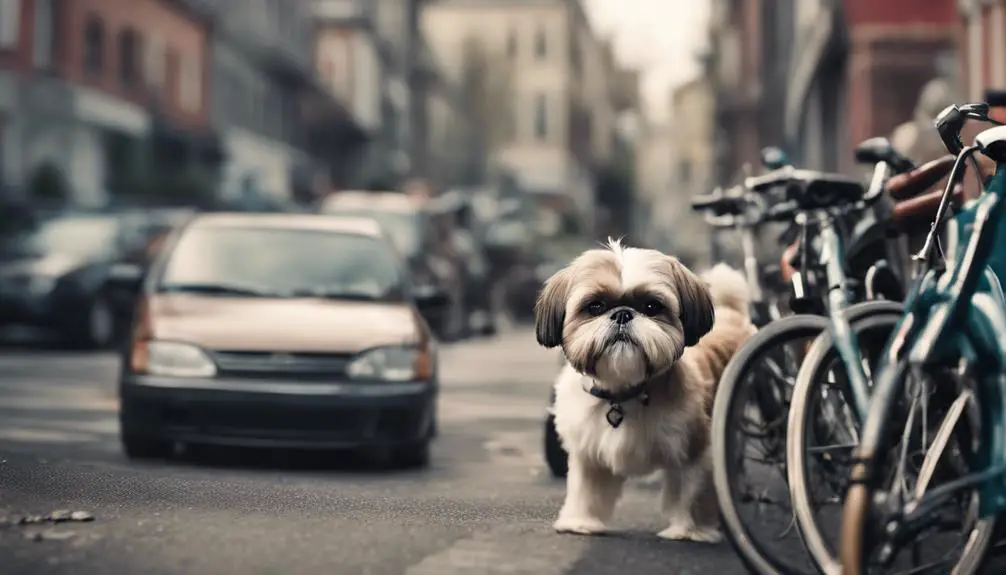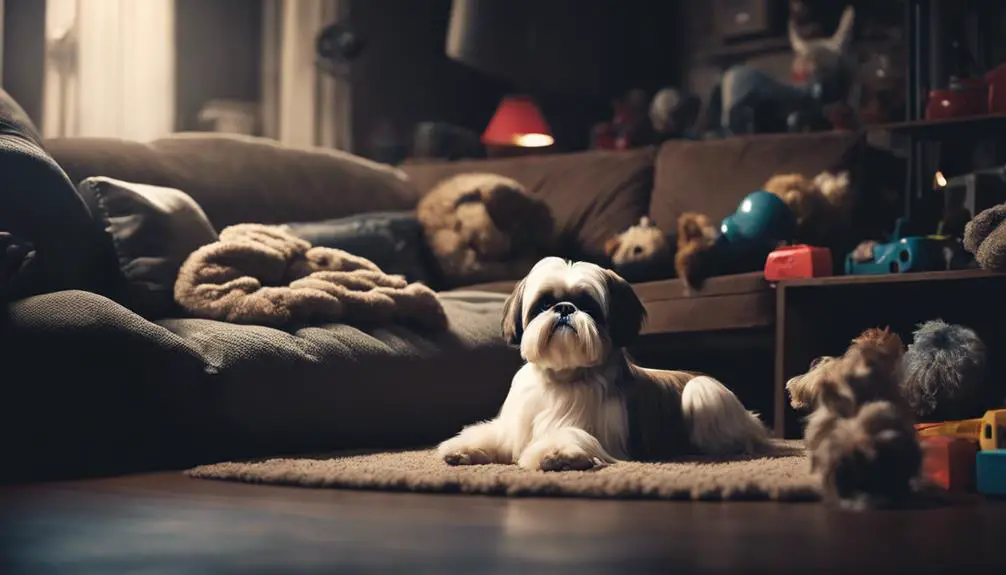As you consider the best and worst environments for your Shih Tzu, it's essential to understand how these settings can dramatically affect their well-being. You might find them basking blissfully in the gentle warmth of a sunny room, where drafts are scarce and the noise level is just right. Contrastingly, in a bustling city center, the high decibel levels and relentless activity could leave your pet feeling anxious or overwhelmed. What might be surprising, however, is how rural and suburban settings each come with their unique sets of challenges and benefits. What do you think could be the ideal setting for a Shih Tzu, and why might some places pose significant issues for their health and happiness?
Ideal Climate Conditions

Shih Tzus thrive best in moderate climates, neither too hot nor too cold. You'll find that their double coat offers some insulation against weather fluctuations but isn't suited for extreme temperatures. In excessively hot climates, they're prone to overheating due to their short noses, which can impede their ability to cool down through panting effectively. Conversely, in very cold conditions, their small size and close-to-the-ground stature make them susceptible to chilling and discomfort.
To maintain their comfort, you should aim for a temperature-controlled environment where the thermostat is kept consistent. Ideally, temperatures should range from 68 to 78 degrees Fahrenheit. If you're living in a region with seasonal extremes, you'll need to take additional measures.
During hot weather, make sure they've access to plenty of shade and fresh water, and consider using air conditioning indoors. In colder seasons, a sweater or coat might be necessary during walks, along with limiting their exposure to the cold.
Urban Living Challenges

Living in a bustling urban environment presents several unique challenges for Shih Tzus, including limited green spaces and increased noise levels. The scarcity of parks and grassy areas restricts your Shih Tzu's opportunities for natural play and exercise, essential for their physical and mental health. Concrete-dominated landscapes can also be tough on their paws and joints during walks.
Furthermore, the constant barrage of city sounds from traffic, construction, and crowds can lead to sensory overload, causing stress or anxiety in your Shih Tzu. High noise levels may disrupt their sleep patterns and overall well-being, making them more irritable or lethargic.
You'll also face challenges with air quality in urban settings. Pollutants from vehicles and industrial activities can compromise your Shih Tzu's respiratory health, especially since they're a brachycephalic breed, prone to breathing difficulties. Frequent exposure to poor air quality can exacerbate these issues, leading to chronic health problems.
Lastly, the densely populated nature of cities increases the risk of your Shih Tzu encountering aggressive or unvaccinated dogs, which can lead to dangerous interactions or the transmission of diseases. It's essential to be vigilant and protective in such environments to safeguard your pet's health.
Benefits of Suburban Areas

In suburban areas, you'll find more spacious and quieter environments that are ideal for your Shih Tzu's well-being. These regions typically offer larger yards and more room for your pet to explore and play safely. This can be vital for maintaining your Shih Tzu's physical health, as they require regular exercise but in a safe, controlled environment due to their small size and sometimes delicate health.
Moreover, suburban settings often provide cleaner air and less congestion compared to urban areas. This is important because Shih Tzus can be prone to respiratory issues; cleaner air can help minimize potential health risks. The reduced noise pollution in suburbs also contributes positively to your Shih Tzu's mental health, as constant loud noises can cause stress and anxiety in pets.
Another significant benefit is the availability of community resources. Suburbs often have well-maintained parks and dog-friendly spaces where your Shih Tzu can socialize with other dogs. Social interaction is essential for your pet's emotional development and can prevent behavior issues linked to isolation or lack of stimulation.
Lastly, suburban areas typically have access to high-quality veterinary services and pet care facilities, ensuring your Shih Tzu receives proper medical care when needed, which is integral for their long-term health and happiness.
Rural Settings: Pros and Cons

Moving to rural settings, you'll discover both advantages and drawbacks for your Shih Tzu. One significant advantage is the abundance of space. In rural areas, your Shih Tzu can enjoy extensive outdoor areas, which are ideal for exercise and play without the constraints of smaller, urban spaces. The quieter environment also reduces stress caused by urban noise, which can benefit your Shih Tzu's overall well-being.
However, rural settings pose certain challenges. One major concern is the availability of veterinary services. Rural areas often have fewer veterinary clinics and specialists, which could delay getting necessary care in emergencies or for routine health maintenance. Additionally, rural environments might expose your Shih Tzu to more wildlife and pests, including ticks and fleas, which could increase the risk of diseases.
Moreover, the isolation of rural settings might limit your Shih Tzu's exposure to other people and dogs, which could affect their socialization. However, with conscious effort, you can mitigate this by scheduling regular visits or trips to more populated areas.
Importance of Socialization Opportunities

While rural settings may limit social interactions, providing your Shih Tzu with ample socialization opportunities is essential to their development and behavior. Socialization helps prevent behavioral problems such as aggression, fearfulness, and excessive barking, which are often exacerbated by isolation.
It's vital to expose your Shih Tzu to a variety of people, animals, and environments from a young age. This exposure helps them become more adaptable and less stressed in unfamiliar situations.
You can enhance your Shih Tzu's social skills by arranging playdates with other dogs, visiting pet-friendly stores, or attending structured canine classes. These activities not only stimulate their mind but also allow them to develop communication skills with both humans and other dogs.
Regular interactions contribute to their overall emotional health and balance, reducing the likelihood of anxiety-related disorders.
Hazards in High-Traffic Areas

High-traffic areas present significant risks for Shih Tzus, including the potential for accidents and overwhelming stress. When you're walking your Shih Tzu in areas bustling with people, bicycles, or vehicles, it's important to maintain a tight leash and vigilant supervision. Due to their small size and curious nature, Shih Tzus can easily slip out of sight or underfoot, putting them at risk of being stepped on or worse, hit by a moving vehicle.
Noise pollution is another concern in these environments. Shih Tzus have sensitive hearing, and the constant barrage of loud sounds can lead to anxiety and long-term stress issues. This heightened state of alert can cause behavioral changes such as aggression or withdrawal, which are detrimental to their well-being.
You should also be wary of the quality of the air in high-traffic areas. Pollution from exhaust fumes can be harmful to your Shih Tzu's respiratory system. Continuous exposure can lead to chronic breathing problems or exacerbate existing conditions.
Lastly, the hot pavement in urban settings can burn their paws, causing pain and potential infections. Always check the pavement temperature with your hand before allowing your Shih Tzu to walk on it.
Home Environment Essentials

To guarantee your Shih Tzu's comfort and safety, it's vital to create a conducive home environment.
To begin with, consider the flooring. Shih Tzus have sensitive paws and can slip on slick surfaces, so opt for non-slip rugs or carpeting. This not only prevents injuries but also provides comfort during rest.
Temperature control is important. These dogs are prone to heat stress due to their short snouts, so maintain a climate-controlled environment, ideally between 68-72°F. During winter, make sure they aren't exposed to cold drafts, as Shih Tzus can easily catch colds.
Noise levels should be monitored. High noise can cause stress or anxiety in Shih Tzus. Use soft music or white noise machines to mitigate outside noise, creating a calm atmosphere.
Space is another significant factor. Designate a specific area for your Shih Tzu to retreat to, equipped with a comfortable bed and their favorite toys. This gives them a sense of security and their own territory within your home.
Conclusion
To guarantee your Shih Tzu thrives, tailor their environment carefully. They flourish in mild climates, quiet suburban or rural areas with minimal high-traffic hazards, and homes offering a cozy retreat with their favorite toys.
Always prioritize opportunities for socialization to keep them engaged and happy. Avoid exposing your Shih Tzu to harsh conditions like cold drafts or noisy, chaotic spaces, as these can lead to stress and anxiety.
Setting up the right environment is key to their well-being.


